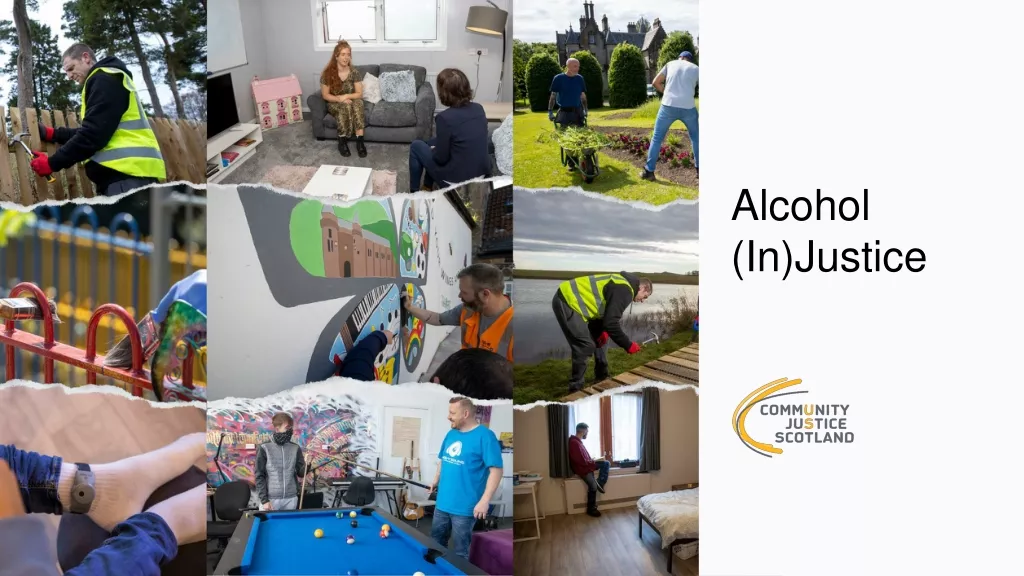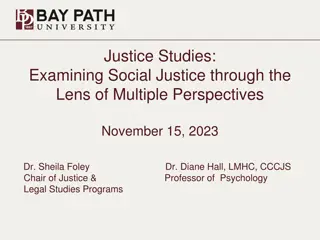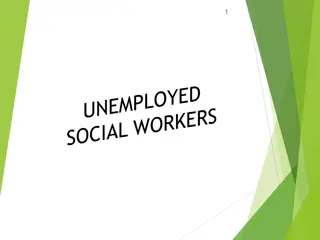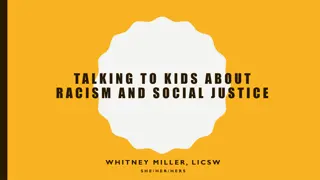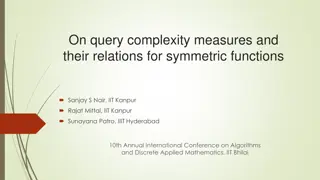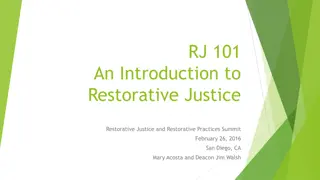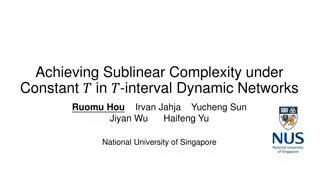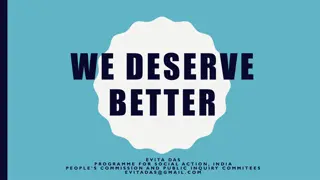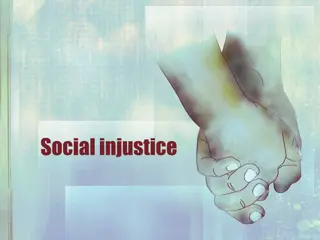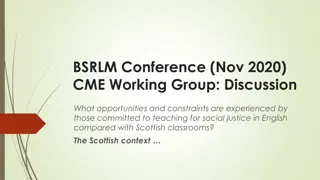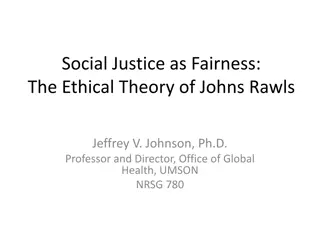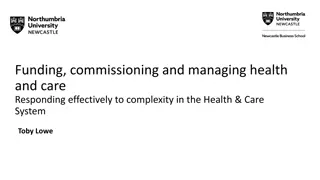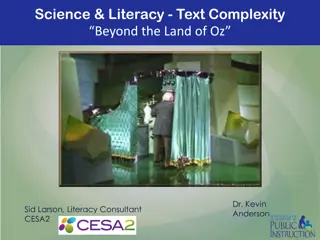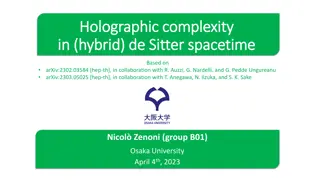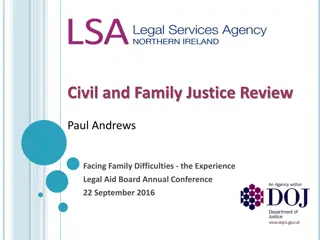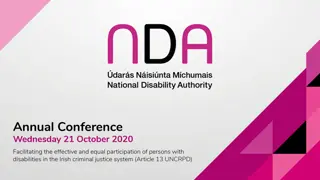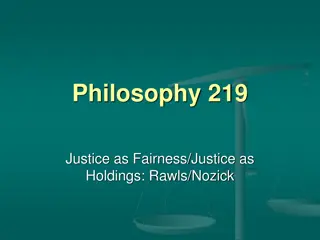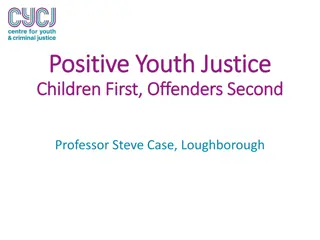Embracing Complexity in Social Justice: A Critical Approach
Embracing complexity in the context of social justice, this material delves into the key principles of Catholic Social Teaching, experiences of social justice in practice, and examples of racism even within well-intentioned communities. It discusses the importance of un-educating and re-educating to challenge perspectives and engage in critical reflection, highlighting the need to start with self-awareness and understanding. Addressing issues of hierarchy, appropriation, and the cultivation of a deeper understanding, it advocates for a pedagogical approach that promotes critical thinking and reflection.
Download Presentation

Please find below an Image/Link to download the presentation.
The content on the website is provided AS IS for your information and personal use only. It may not be sold, licensed, or shared on other websites without obtaining consent from the author.If you encounter any issues during the download, it is possible that the publisher has removed the file from their server.
You are allowed to download the files provided on this website for personal or commercial use, subject to the condition that they are used lawfully. All files are the property of their respective owners.
The content on the website is provided AS IS for your information and personal use only. It may not be sold, licensed, or shared on other websites without obtaining consent from the author.
E N D
Presentation Transcript
BEYOND DECOLONISING SOCIAL JUSTICE: EMBRACING COMPLEXITY AT THE KNOWLEDGE INTERFACE Dr Gabrielle Russell-Mundine Mr Graeme Mundine Aboriginal Catholic Ministry, Sydney www.acmsydney.org
WHO DO WE WORK WITH? Churches -hierarchy, Religious and Clergy, lay people Education school teachers, university students Social Justice Catholic agencies, justice groups, public.
WHAT IS SOCIAL JUSTICE IN OUR CONTEXT? The key principles of Catholic Social Teaching are: Human dignity Every human being is made in the image and likeness of God. The common good we are all responsible for each other and must work for social conditions which ensure that every person and every group in society is able to meet their needs and realize their potential. Subsidiarity responsibility should be kept as close as possible to the grassroots. The people or groups most directly affected by a decision or policy should have a key decision making role in it. Solidarity a firm and persevering determination to commit oneself to the common good. www.social-spirituality.net
WHAT IS OUR EXPERIENCE OF SOCIAL JUSTICE IN PRACTICE? Missionary we ve come here to save them. Charity we need to help them . Essentialising we love Aboriginal people Appropriating we want to learn Aboriginal culture . Diminishing move on and get over it . Me me me I feel guilt/sad/angry.
ONE EXAMPLE OF RACISM BY GOOD CATHOLICS! At a recent Church conference non-Indigenous people ran three out of four workshops on incorporating Indigenous culture in the church. Acknowledged lack of expertise/knowledge but still took the space and set the agenda. Kept asking the Aboriginal expert in audience to comment but wouldn t allow him to take lead. Invited Aboriginal people to resist and protest a particular situation - said that we all have to take our own power Used a Coolamon without explanation and said we will sit in a circle because that s the Aboriginal way . When Aboriginal expert made the statement the Church is racist said no it s not!
OUR PEDAGOGICAL APPROACH Un-educate and re-educate Aim to challenge but also engage for deeper and ongoing critical thinking and reflection. Always start with the self. Who are you, what influences you, what are your attitudes, understanding yourself as a cultured person. Can locate practice in Whiteness /education /racism/critical pedagogy theory but driven by praxis.
OUR PEDAGOGICAL APPROACH The task of the critical educator is to enable individuals to acquire a language through which to reflect upon and shape their experiences and in certain instances transform such experiences in the interest of social responsibility Giroux and McLaren, Schooling, quoted in McLaren Critical Literacy and Postcolonial Praxis: A Freirian Perspective, College Literature, Vol. 19/20, No/ 3/1 Teaching postcolonial and Commonwealth Literatures (Nov 1992 Feb 1993), pp 7-27
THE COMPLEXITY OF THE CULTURAL INTERFACE Have to find ways to engage people in understanding the impact of the dominant culture by unveiling the cultural norms they subscribe to in a way that they can unravel. Need to move people from bleeding heart do gooders to active dismantlers of injustice. Need to challenge those who espouse a commitment to social justice but don t live it.
Remember Recognise Rectify
WHATWORKS People need to have an experience. Create an environment to challenge in such a way that engages people rather than leaves them hiding behind defences. Recognise that we are trying to change hundreds/thousands of years of thinking. Encourage uncertainty allows re-thinking and critical thinking. Have to allow people to grow in their own time.
CHALLENGES Limited time with small groups. Retelling the story and have to keep telling. The people who come to work with us are often not the ones that need to work with us they are outside the room. Personal cost both introverts! Personal relationship important to engage but both silenced in different ways.


